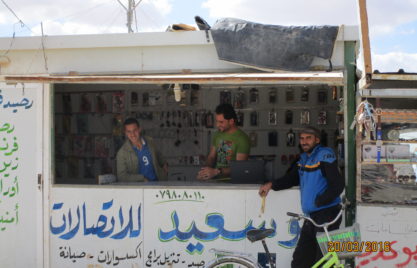Many people in Jordan do not have access to financial services, particularly the youth, women and rural low-income population. Microfinance is an essential means to financial inclusion. The rapid growth of the sector in the Kingdom, however, has triggered the financial supervisor’s move to regulate MFIs in order to safeguard the stability of the financial system and the protection of clients. Supported by GIZ, the examiners are now specializing in the supervision of microfinance.
The specificities and degree of professionalism of MFIs poses a particular challenge for a supervisor. Compared to banks, MFIs are usually smaller, less professionalised, and serve target groups with limited resources and collateral, are often located in remote areas and demand small-scale and short-termed services. In Jordan, the rather young microfinance sector further depends on subsidies and competition among the few MFIs is relatively small impeding financial and operational sustainability.
Ensuring a flourishing microfinance sector while avoiding undesired effects from excessive lending such as over-indebtedness and systemic defaults requires a regulatory and supervisory approach that is well adapted to the specificities of MFIs. Having studied the Moroccan microfinance crisis during a visit last year, the Central Bank of Jordan (CBJ) is now setting up the cornerstones for a thorough supervisory framework for the microfinance sector in Jordan. It is doing so with the support of GIZ through trainings such as in the analysis of the financial soundness and of consumer protection in MFIs, consultations with the sector, and international exchange visits, all of which adds to the development of a supervisory tool for the Jordanian microfinance market.
While considering the characteristics of MFIs in Jordan, the supervisory analysis instrument helps to examine the microfinance business by looking into different, yet all intertwined areas within the organization. The specificities of Jordanian MFIs suggested to add the effectiveness of client protection and the outreach of services. By considering the core areas in MFIs and their linkages, the tool helps to supervise a MFI’s business, financial soundness and market conduct. It will warn the supervisor of distress just as the neural system warns one of health issues caused by hunger or thirst.
Given its supervisory mandate, the CBJ is catering to assure a microfinance market that effectively and sustainably contributes to social and economic development in Jordan, while looking at developments that are harmful to the people and the market early enough. Supported by the GIZ MFMR programme within the EU supported action, the CBJ has taken the next step towards a flourishing and sound microfinance sector. It will give rise to new investment opportunities and innovation, allowing MFIs to expand their activities and outreach to unserved people in the Kingdom.
by Robin Schimmelpfennig and Atilla Yuecel



